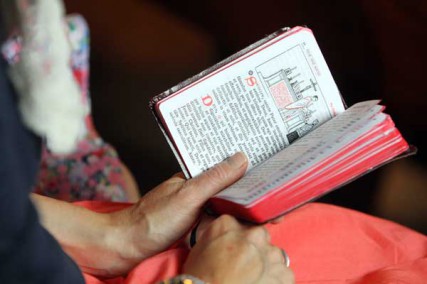VATICAN CITY (RNS) A breakaway traditionalist group has expelled Bishop Richard Williamson, a British prelate who in 2009 sparked a global crisis in Jewish-Catholic relations for denying the Holocaust shortly before Pope Benedict XVI readmitted him to the church.
The staunchly conservative Society of St. Pius X (SSPX) announced on Wednesday (Oct. 24) that Williamson had been “excluded” from its ranks on Oct. 4 because of his refusal to “show due respect and obedience to his lawful superiors.”
The SSPX statement described Williamson’s expulsion as a “painful decision” and made no mention of his vocal Holocaust denials.

A woman uses a missal during a traditional Latin Mass at St. Michael the Archangel Chapel in Farmingville, N.Y., June 17. The chapel is administered by the Society of St. Pius X.
In January 2009, Williamson denied the existence of Nazi gas chambers in a TV interview with a Swedish documentary program. He also questioned the general consensus among historians that 6 millions Jews were killed during the Holocaust.
His words became public just days before Benedict lifted the excommunication of the four SSPX bishops, including Williamson.
The move was aimed at paving the way for full reconciliation between SSPX and Rome, but proved a major embarrassment for the German pope and the Vatican. Jews from all over the world sought reassurance that the Catholic Church was still committed to Jewish-Christian dialogue that was started by the Second Vatican Council (1962-1965).
The SSPX rejects the liberalizing reforms of the council, which opened a new era in Catholic-Jewish relations after centuries of mistrust and religiously motivated violence.
Responding to the crisis, Benedict wrote an unprecedented letter to Catholic bishops saying he was unaware of Williamson’s positions, and called on Vatican departments to make more use of the Internet, where the bishop’s statements were widely available.
Since then, Williamson remained a stumbling block on the path of reconciliation between the SSPX and Rome. In May, the Vatican warned that even in the case of an agreement, the position of every SSPX bishop would be vetted individually.
Williamson’s expulsion, however, is unlikely to salvage the Vatican-SSPX negotiations that seem to have arrived at an impasse.
After more than two years of “doctrinal dialogue,” the Vatican’s doctrinal office in June presented SSPX leaders with a final offer, reportedly requiring acceptance of the Second Vatican Council as part of church doctrine.
The traditionalist group has yet to issue an official response, but its top officials signaled on several occasions that it is unacceptable. “The possibility of an agreement becomes more distant,” SSPX Bishop Alfonso de Galarreta told a traditionalist conference on Oct. 13.
Williamson had always opposed any reconciliation with Rome, and in the past months had called for the SSPX leadership to resign.
The Simon Wiesenthal Center said until the SSPX reforms itself, Williamson’s ouster will be “no more than cosmetic surgery that attempts to cover up the ugly reality of anti-Semitism and hate that is imbedded in the theology of the SSPX.”
KRE/AMB END SPECIALE




